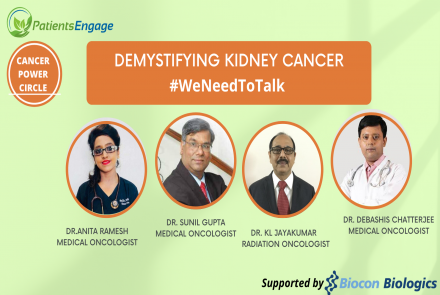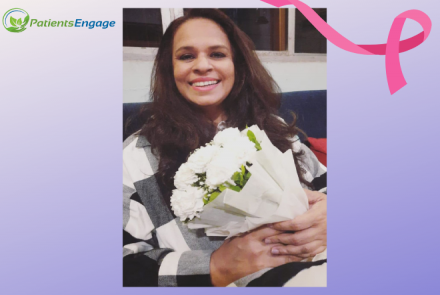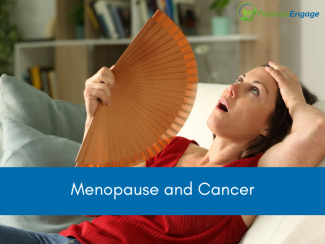
Developing menopause while going through cancer is a double whammy for all women. The sudden jolt of menopause caused by cancer treatment is not only physically but mentally straining as well. Can physiotherapy help alleviate these distressing menopausal effects and improve quality of life for women with cancer? Ajeeta Kulkarni, a senior physiotherapist at Tata Memorial hospital in Mumbai, tells us how.
What are the causes of menopause in cancer patients?
Menopause is the decline in the reproductive hormones causing the stoppage of a woman’s menstrual cycle for a period of atleast 12 months. This is a natural process in a woman’s life which usually occurs any time after the age of 45 years. There may be a temporary or a permanent menopause depending upon the cause of menopause.
The main causes of permanent menopause in cancer patients are the complete surgical removal of the ovaries and the uterus in gynaecological cancers or radiation to the pelvic region resulting in damage to the ovaries.
Chemotherapy can induce menopause either temporarily or permanently depending upon the age of the patient and the treatment given. Younger age group may get back their periods after completion of chemotherapy. Patients above the age of 45 years (if they are closer to their natural menopause) may have permanent menopause after chemotherapy.
Certain hormonal drugs, which block the estrogen receptors also induces menopause.
What are the concerns (both physical and mental) with young women having cancer-induced menopause?
Young women undergoing cancer treatment face premature menopause and have to deal with the physical and psychological consequences which includes fertility issues, premature ovarian failure, depression, anxiety, and poor quality of life. Menopausal symptoms like hot flushes, night sweats, sleep disturbances, vaginal dryness, loss of libido, etc in younger age are more severe and traumatic. Women lose interest in sexual activity due to vaginal dryness and painful intercourse leading to vaginal atrophy in younger age and this creates disturbances in marital life. Women with gynaecological cancers post surgery and radiation may have urinary incontinence, which affects quality of life.
Fatigue sets in due to the systemic treatment and sleep disturbances adds on to the fatigue levels.
Weight gain and body image issues are more significant and devastating in young women having cancer induced menopause.
Related reading: Going through early menopause
What are the issues related with menopausal women going through cancer vs women having cancer treatment -induced menopause?
Menopausal women going through cancer treatment may have aggravated menopausal symptoms, weakness, fatigue and decreased quality of life.
Premenopausal women who are detected with cancer may have cancer treatment induced menopause which may be temporary or permanent. This is due to decreased blood supply to the ovaries resulting in its endothelial dysfunction and there is increased oxidative stress in the ovaries which leads to follicular cell death. The damage may be temporary or permanent which creates fear in these women regarding fertility issues and marital life.
What are the menopausal symptoms/signs due to cancer treatment?
Cancer related treatment leads to ovarian failure or damage to the ovaries which leads to physical symptoms like hot flushes, night sweats, dry skin, vaginal dryness, urinary frequency and urgency, sometimes incontinence (difficulty controlling urine), urinary tract infections, joint pain, headache, palpitations, etc. There are psychological symptoms like anxiety, irritability, low mood or mood swing, insomnia, low libido, etc.. Patients experience a feeling of fatigue or tiredness and may have muscular weakness or atrophy. These are symptoms of menopause either natural or cancer induced, both are similar.
What role does physiotherapy play?
Physiotherapy plays an important role in both natural and cancer treatment induced menopause. Exercise interventions help in reducing fatigue, prevents weight gain, improves quality of life, alleviates mood thus reducing the anxiety and depression levels. Aerobic exercises help in building endurance.
Obesity is a risk factor for many cancers like breast cancer, endometrial cancers, gastrointestinal cancers, esophageal cancers, bladder cancer, liver cancers, etc. In premenopausal women, there is association of obesity with more aggressive triple negative breast cancer. In post menopausal women, there is association of obesity with estrogen receptor ER positive breast cancer. In both cases, there is high risk of death due to obesity. Physiotherapist can prescribe an exercise protocol which helps in changing the hormone levels, reduce percentage of body fat and enhance the immune system.
There are certain conditions like osteoporosis, joint pain, cardiovascular diseases, etc where the women need to visit a physiotherapist for proper evaluation and treatment.
What exercises and support is provided by a PT?
Exercises are very essential for maintaining a healthy life during and after cancer treatment. There are various types of exercises needed for the body. They are as follows:
- Warm up and Cool down: These include mild exercises like spot marching, leg swing, lunges and stretching to get the body ready for the actual exercises and to gradually cool down the body after the exercises.
- Stretching. Stretching improves flexibility, prepares patient’s muscles for workout, and post exercise stretching is effective as muscles are warm and receptive to stretching.
- Aerobic activity. Aerobic activity like walking, jogging, stationary cycling, biking, swimming help to maintain a healthy weight and the aerobic capacity can be increased by gradually increasing the intensity and duration.
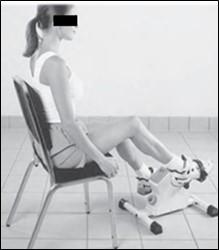
Cycling: Non-Weight bearing aerobic exercises (Therapeutic Exercise; Kisner & Colby)
- Strength training. Muscle weakness and muscle atrophy needs regular strength training which also helps to reduce body fat and replace it with more muscles. Muscle strength can be increased by weight cuffs or machines and resistance bands or tubes. The resistance should be chosen as per moderate rate of perceived exertion felt after about 10 repetitions and gradually increase the resistance as the muscles adapt to the previous resistance.
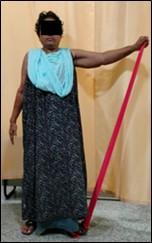
Resistance Exercises (Patient Photo)
- Stability and balance. Menopause and certain chemotherapeutic drugs may trigger balance and gait issues which need to be addressed to improve stability and prevent falls.
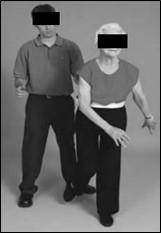
Balance Training (Therapeutic Exercise; Kisner & Colby)
- Kegel’s Exercises. Post-menopausal women may have pelvic floor weakness which can be strengthened by Kegel’s exercises, Electrical stimulation and Biofeedback. Kegel’s exercises improve the tone and strength of pelvic floor muscles.
- Relaxation Techniques. There are many relaxation techniques like the Jacobson’s progressive relaxation therapy which concentrates on tensing of muscles followed by its relaxation, so that the feel of muscles is appreciated and with regular practice, the technique of muscle relaxation can be mastered. Similarly, relaxation for mind is essential which can be achieved by breathing exercises, yoga and meditation. This helps relieve anxiety, lowers stress, decreases blood pressure and improves sleep.
- Aquatherapy. Swimming and exercises in water are good exercises where the water can offer resistance for certain exercises and the buoyancy of the water allows the body to float reducing the effects of gravity.
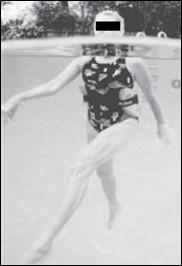
Exercises under water (Therapeutic Exercise; Kisner & Colby)
How often and for how long should these exercises be continued?
As per ACSM guidelines, the exercise prescriptions are based on the F.I.T.T principle ie Frequency, Intensity, Time and Type of exercises. The exercises prescribed are as follows:
|
|
Aerobic | Resistance | Flexibility |
|
Frequency |
3-5 days/week | 2-3 days/week | Daily is best |
|
Intensity |
Moderate to Vigorous | Start with low resistance and progress with small increments possible | Move through Range of Motion as tolerated |
|
Time |
75mins/week of vigorous or 150mins/week of moderate intensity | Atleast 1 set of 8-12 repetitions | 10 to 30 secs hold for static stretching |
|
Type |
Prolonged rhythmic activities using larger muscle groups | Free weights, resistance bands, or weight bearing functional tasks (eg. Sit to stand, targeting larger group muscles) | For all large muscle groups and address specific joint of muscle restriction caused due to treatment like surgery and radiation |
Are there any reasons when patients should not be doing these exercises? and why?
Women undergoing cancer treatment should watch out for their blood counts and if the Haemoglobin (Hb) is less than 8 gm/dL, platelets are less than 50000, then restrict exercises because lower Hb decreases oxygen carrying capacity thus causing breathlessness. Lower platelets will lead to bleeding tendency.
Other contraindications include fever, nausea, vomiting, dizziness, extreme fatigue, weakness, ataxia, cardiovascular and pulmonary contraindications.
Are there any long-term effects of menopause that women should be alerted on? How can these be prevented?
The premenopausal women have their ovaries functional which secrete estrogen. After menopause, the estrogen and other hormonal levels decrease drastically because of which the bone density falls leading to osteopenia/ osteoporosis, the lubrication in joints reduces leading to joint pain.
Menopause reduces the muscle strength due to decrease in muscle fibre and muscle atrophy (sarcopenia) causing loss of muscle function.
Estrogen also plays a protective role for the heart and the blood vessels which prevents cardiovascular problems. Long term effect of menopause is the risk of high blood pressure, high cholesterol, and coronary heart diseases.
Regular exercises, strength training and appropriate diet modifications help prevent or reduce the long-term effects of menopause.
What are the challenges in India for women going through cancer treatment alongside menopause?
The commonest cancers in women are the breast cancer, uterine cancer, ovarian cancer and the cervix cancer wherein the treatment usually includes surgery, chemotherapy and/or radiation. In India, there are larger families and women are expected to fulfil various responsibilities and cancer treatment hampers their significant role in the family. So women tend to neglect their health and have delayed diagnosis of cancer. Besides, the financial constraint is significant. Women may not always get the family support, may have less social support and lesser financial support.
Menopausal women already have health issues like vasomotor symptoms, osteoporosis, muscle loss or atrophy, balance problems, etc. When these women undergo cancer treatment, these symptoms aggravate and patients suffer from cancer related fatigue and weakness. The allied health care and supportive care facilities may not be available everywhere and quality of life deteriorates.
How can the spouse and family provide better support during and post treatment?
The support of the spouse and family is of utmost importance. After the diagnosis of cancer in women, their family life and marriage may face difficult times, especially when the symptoms of cancer and the side effects of its treatment are severe. Additionally, if the woman is undergoing menopausal symptoms as well, naturally or treatment induced menopause, the results are devastating. Younger patients who are suffering from treatment induced menopause are more scared of the disease because they see their future life suffering. The spouse needs to stay calm and support the patient at such crucial times. The family should take over the responsibilities of the woman suffering from the disease. But it has been observed that the spouse is even stressed due to physical, emotional and financial burden. Hence counselling sessions should be attended by both, the patient and the spouse. Post treatment, it may take some time for the patient to recover wherein the family should adjust and allocate sufficient time for the patient to recover. The patient should concentrate on getting healthier by proper diet, exercises and medications. The spouse or the family can help in scheduling doctor’s appointments, keeping track of the medications, participating in planning the exercises and diet, managing finances, and giving emotional & spiritual support. The family can become the motivational factor for speedy recovery.
Are there any tips or coping mechanisms you would like to suggest?
It is very important to maintain a healthy lifestyle during peri-menopausal phase and after menopause. Weight reduction becomes essential, regular exercises should be done. Weight bearing aerobic exercises like running, jogging, dancing helps maintain bone health along with vitamin D and calcium supplements to prevent osteoporosis. Aerobic exercises also improves heart diseases, sleep patterns, reduce anxiety and stress and alleviates mood.
Eating a healthy diet, avoiding spicy food and caffeine, limiting alcohol and cigarettes can help reduce the hot flushes. Practising relaxation techniques and yoga, wearing light weight clothes, sleeping in cooler room, sleeping for appropriate time with fixed timings, etc may reduce stress, relax the mind and alleviate the mood. Cognitive behaviour therapy (CBT) is a mind therapy which helps to change the thought process and change the mood and relieve stress.
References:
- Shoshana M. Rosenberg, Ann H. Partridge; Premature menopause in young breast cancer: effects on quality of life and treatment interventions. J Thorac Dis. 2013 Jun; S55–S61
- Katlynn M. Mathis, et al; Exercise and chemotherapy-induced amenorrhea. Medical Hypotheses 116 (2018) 49–53
- Saskia FA Duijts, et al; Cognitive behavioral therapy and physical exercise for climacteric symptoms in breast cancer patients experiencing treatment-induced menopause: design of a multicenter trial. BMC Women's Health 2009, 9:15
- Manuel Picon-Ruiz, et al; Obesity and Adverse Breast Cancer Risk and Outcome: Mechanistic Insights and Strategies for Intervention. CA CANCER J CLIN 2017;67:378–397
- Deborah Riebe, et al, ACSM guidelines for Exercise Testing and Prescription. 10th Edition 2016.
- Mercedes Blanquet Rochera, et al; Physiotherapy as a Way to Maintain Vaginal Health during Menopause. Advances in Sexual Medicine, 2017, 7, 97-104
- Erik Aprilianto, et al; Family social support and the self-esteem of breast cancer patients undergoing neoadjuvant chemotherapy. Journal of Public Health Research 2021; volume 10:2234
- Vahid Mehrnoush, et al; Efficacy of the Complementary and Alternative Therapies for the Management of Psychological Symptoms of Menopause: A Systematic Review of Randomized Controlled Trials. J Menopausal Med 2021;27:115-131

Senior Onco-Physiotherapist in Tata Memorial Hospital, Mumbai
Graduation in Physical Therapy, Seth G. S. Medical College, K.E.M. Hospital, Mumbai, India
Certified Lymphedema Therapist (Ludec) UK, MSc in Psychology, Madras University, India







